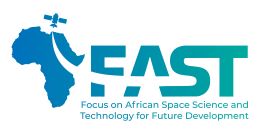The future prosperity of Africa depends on the creation of sustainable mechanisms to generate the nation’s ability to access the tools of space technology and in turn, this requires the inclusion of the right set of skills in HEIs to deliver the workforce necessary for the development of this technology. Globally the exponential growth of PSST, which covers a broad array of STEM programme elements, has had a significant impact on people’s lives and affects society at large. PSST has been recognised in Africa as of increasing importance to both drive the Knowledge Economy and the 4th Industrial Revolution and provide a range of benefits in a range of areas that are critical to our general prosperity and well-being. Strengthening the HEIs capacity in PSST therefore provides the possibility of addressing some of Africa’s greatest 21st century developmental challenges, bringing considerable economic and societal opportunities, sustainable economic growth and boost the digital transformation moving toward the 4th industrial revolution. As such, FAST4Future will introduce a novel approach for the strengthening of STEM in African higher education by investing in fostering capacities in PSST and creating a sustainable STEM environment in Africa and for Africa. To achieve these
ambitious targets, we envisage a change in paradigm by coupling the traditional ‘capacity building’ with a new ‘building on capacity.’
Focus on Africa Space Science and Technology 4 Future development (FAST4Future) aims at strengthening Science, Technology, Engineering and Mathematics (STEM) in Africa Higher education by promoting Planetary and Space Science and Technology (PSST) for the sustainable growth and jobs creation in a continent that is rapidly embracing the 4th industrial revolution. PSST has been identified as a key area of investment in Africa as it provides graduates and young scientists with both the necessary soft and practical skills to face 21st century challenges such as digital innovation and job creation. The aims of FAST4Future are:
- To increase the accessibility to STEM in African Higher Education (HE);
- To modernize existing PSST programmes in collaboration with industry and policy makers;
- To foster the internationalization of partner HEIs by promoting mobility of staff;
- To promote standardization of PSST in Africa in support of students’ mobility.
To achieve these ambitious goals FAST4future will promote the creation of a Centre of Excellence in PSST (CESST) linked to a virtual platform to increase the accessibility coordinate collaborative actions including:
- Analysis of the conditions of women in STEM;
- Review existing PSST programs in order to fill the mismatches between academic offer and job market requirements;
- Draft a white paper for the credit recognition of PSST courses across African institutions;
- Train administrative staff and facilitate the mobility of academic staff;
- Promote the transfer of skills in key strategic areas of PSST to boost the employability of graduate students.
The creation of a virtual platform within CESST will open new pathways for dissemination of high quality academic contents that can potentially reach thousands of STEM students across the continent and facilitate the access to STEM disciplines for Africans living in remote areas, conflict zones and will, eventually, improve the number of women in STEM.



